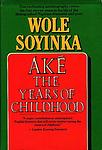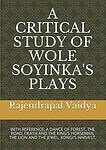Wole Soyinka
Wole Soyinka is a renowned Nigerian playwright, poet, and essayist. He was awarded the Nobel Prize in Literature in 1986, becoming the first African laureate to be honored in that category. Soyinka's work often addresses themes of oppression, tyranny, and human rights, often against the backdrop of African culture and mythologies. He has been a strong advocate for democracy and against corruption and tyranny in Nigeria and across Africa.
Books
This list of books are ONLY the books that have been ranked on the lists that are aggregated on this site. This is not a comprehensive list of all books by this author.
-
1. Ake: The Years Of Childhood
"Ake: The Years of Childhood" is a memoir that chronicles the early years of a Nigerian boy growing up in the town of Ake. Set in the 1940s, the book vividly captures the author's experiences, from his close-knit family life to his encounters with colonialism and the struggle for independence. Through his insightful and lyrical prose, the author takes readers on a nostalgic journey filled with rich cultural traditions, humorous anecdotes, and poignant reflections on the complexities of childhood.
The 2173rd Greatest Book of All Time -
2. The Man Died
"The Man Died" is a powerful non-fiction work that delves into the harrowing experiences of the author during his 22-month imprisonment without trial by the Nigerian government. Written during the Nigerian Civil War, the book is a poignant exploration of the depths of human suffering and the resilience of the spirit. Through a series of reflections, narratives, and meditations, it exposes the brutalities of political oppression and interrogates the silence and complicity surrounding acts of torture and injustice. The author's vivid prose and philosophical insights challenge the reader to confront the complexities of human rights, dignity, and the struggle for freedom in the face of tyranny.
The 3262nd Greatest Book of All Time -
3. Death And The King's Horsemen
"Death And The King's Horsemen" is a powerful play set in Nigeria during the colonial era. It explores the clash between traditional African beliefs and the influence of Western culture. The story follows the tragic consequences that unfold when a British colonial officer tries to prevent the ritual suicide of the king's horseman, who is duty-bound to accompany his deceased king to the afterlife. The play delves into themes of cultural identity, the clash of civilizations, and the consequences of interfering with sacred traditions.
The 3716th Greatest Book of All Time -
4. Interpreters
"Interpreters" weaves together the stories of a group of young Nigerian intellectuals navigating the complexities of postcolonial life in the 1960s. Through their intertwined lives, the novel explores themes of corruption, societal change, and the search for cultural identity. The characters, who work as interpreters both literally and metaphorically, strive to find their place in a country where the traditional and the modern are in constant tension. The narrative delves into their personal and professional struggles, shedding light on the broader political and social issues facing the newly independent nation.
The 5929th Greatest Book of All Time -
5. A Dance Of The Forest
The book is a complex play that delves into the themes of identity, history, and the cyclical nature of human folly. It is set in an African village where the community is preparing for a festival to honor the return of their dead ancestors. As the living interact with the spirits of the past, the play reveals the characters' personal and political failings, reflecting on the post-colonial experience of African nations. Through a blend of myth, ritual, and satire, the narrative challenges the characters—and by extension, the audience—to confront their own complicity in societal issues, questioning the possibility of true progress and self-understanding.
The 7144th Greatest Book of All Time




